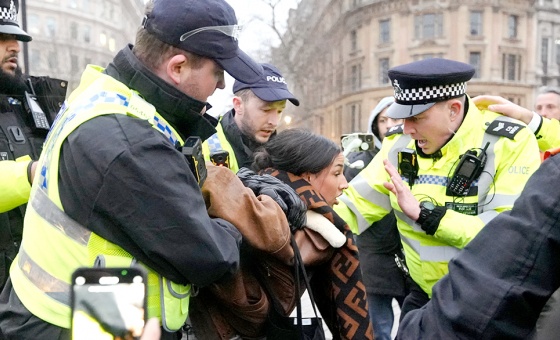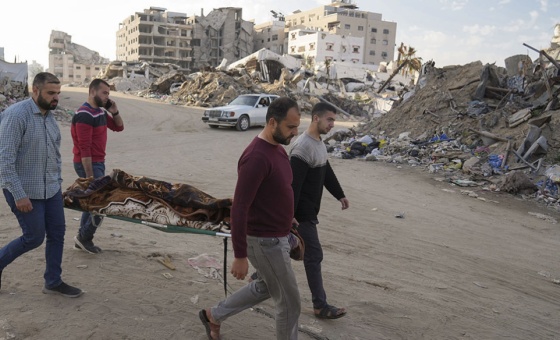This is the last article you can read this month
You can read more article this month
You can read more articles this month
Sorry your limit is up for this month
Reset on:
Please help support the Morning Star by subscribing here
Recent worsening relations between Moscow and Kiev, in the shape of efforts to isolate Crimea and a subsequent termination of Russian gas supplies to its neighbour, underline the dangers to the shaky ceasefire in eastern Ukraine.
Western media asserts that blame for friction between the two former Soviet republics lies exclusively with Moscow.
Consensus has it that Russian President Vladimir Putin is intent on prising away the Donetsk and Lugansk provinces from Ukraine towards incorporation in Russia, as Crimea was.
In this book Andrew Murray, who makes clear his scepticism towards Putin and Putinism, draws a distinction between the desire of the rebel people’s republics and the Russian president’s preference for a negotiated solution while providing just enough assistance to the rebels to prevent their annihilation.
He quotes at length from a 2014 Putin speech laying out why Crimea was a different proposition from the eastern republics.
The Russian leader acknowledged that the overwhelmingly Russian population of Crimea felt as though they had been handed over like a sack of potatoes to newly independent Ukraine in 1991.
They were not alone. Millions of Russians found themselves on the other side of what had once been internal borders but now delineated different countries and even the frontiers of hostile blocs.
Putin suggested that Russians may be the “the biggest ethnic group in the world to be divided by borders.”
Whatever his misgivings about 1991, or even Nikita Khruschov’s never-explained 1954 decision to switch Crimea from Russia to Ukraine, Putin held inter-state border discussions with then Ukrainian president
Leonid Kuchma.
Holding these talks meant, said Putin, that “everyone had a clear understanding that by agreeing to delimit the border we admitted de facto and de jure that Crimea was Ukrainian territory, thereby closing
the issue.”
Underpinning this assumption was that Ukraine would remain a friendly neighbour. But the 2014 political crisis threw this calculation into the air.
Putin understood the motivation of the protesters who demonstrated peacefully in Kiev against government corruption, inefficiency and poverty, noting that politicians had “milked the country, fought among themselves for power, assets and cash flows and did not care much about the ordinary people.”
However, the subsequent coup, as President Victor Yanukovych fled the country, was masterminded by “nationalists, neonazis, Russophobes and anti-semites,” putting a different complexion on events and instilling fear and apprehension among Ukraine’s Russian population and Russian-speakers.
The issue of Crimea and Russia’s Black Sea Fleet based in Sebastopol came to the fore. Putin cited a plebiscite among Crimeans as justification, alongside Moscow’s determination to retain its Black Sea base, for his dispatch of Russian troops to assert Moscow’s annexation of the region.
He derided Nato and European Union claims of illegality, pointing out there was no difference in principle between Crimea’s decision to leave Ukraine and Kosovo’s to declare independence from Serbia, which was supported energetically by the West.
Murray’s book is not simply an account of Russo-Ukrainian relations, although he delves into its history, patchwork quilt of population groups and fluctuating borders dictated by the military power of other states. Current borders are those laid down under Soviet power, expanding Ukraine’s size with territory previously occupied for decades by Poland,
Romania and Hungary.
Murray’s primary concern is to situate the Ukrainian crisis within theories of imperialism — principally, though not unquestioningly,
Lenin’s analysis of the “highest stage of imperialism.”
Even here, he raises the suggestion that “highest” might have been an error of translation that should possibly have been rendered “latest.”
He notes that the major difference since Lenin’s time is that, while British imperialism was then first among equals in a field of half a dozen today the US, although weakened economically — especially by the rise of China — remains the “only contender for a global hegemonic role.”
Rapid European Union expansion, especially since the demise of the Soviet Union and its east European allies, has strengthened the EU geographically and numerically but also threatens the bloc with imperial
overstretch.
The EU is both a rival and a partner to the US, conceding the lead role to Washington, which has theorised its determination to “retain the pre-eminent responsibility for addressing selectively those wrongs which threaten not only our interests but those of
our allies or friends or which could seriously unsettle international relations.”
Washington asserts its “right” to intervene in strategically vital areas that include every region of the world but it needs the assistance of its junior imperialisms and global financial institutions to do so.
The presence of then EU foreign policy head Catherine Ashton and US Republican Senator John McCain in Kiev’s Maidan Square as Right Sector paramilitaries battled police encapsulates those realities.
Murray’s relatively short volume packs a great deal into its pages, including a couple of polemical pieces as appendices that give free rein to his delight in confronting critics of his political stances.
Much of this book merits return visits, not least for the beauty and precision of his language. Christmas stockings beckon.









